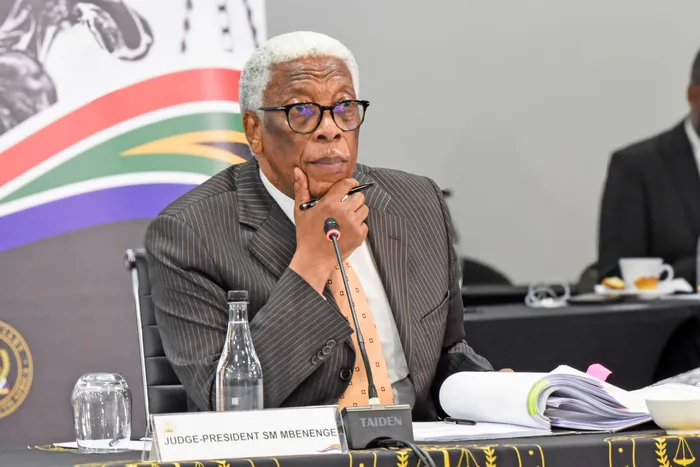Understanding the implications of new sexual harassment policy in SA's judiciary

Eastern Cape Judge President Selby Mbenenge gave his version to the Judicial Conduct Tribunal regarding accusations of sexual harassment against him.
Image: Office of the Chief Justice / S Lioners
In the closing arguments of the Judicial Conduct Tribunal against Judge President Selby Mbenenge earlier this month, the issue arose about whether the sexual harassment policy for the judiciary, introduced by Chief Justice Mandisa Maya on Women’s Day, may be considered when assessing the evidence before the tribunal.
Judges Matter took a closer look at this issue and said that from research conducted, both abroad and locally, it has learnt that sexual harassment occurs within the legal profession and on court premises, and not just among judges.
While the case against Judge Mbenenge is probably the most high-profile, it is unfortunately not the only case of sexual harassment involving a judicial officer.
Judges Matter pointed out that KwaZulu-Natal Regional Court President Eric Nzimande is currently facing more than 100 disciplinary charges before the Magistrates Commission, some of which relate to sexual harassment and sexual extortion.
Similarly, in 2023, Parliament impeached former magistrate Mziwonke Hinxa for sexual harassment.
It is in this context that Chief Justice Maya, after years of urging by various stakeholders, including Judges Matter, introduced the Sexual Harassment Policy of the South African Judiciary on Women’s Day.
Judges Matter explained that the policy defines sexual harassment as “unwanted conduct of a sexual nature”. It states that “this policy has been created to reaffirm the core values of the South African Judiciary: integrity, accountability, equality, dignity and respect. It provides mechanisms to protect against victimisation or retaliation under any and all circumstances”.
It goes on to say that “it is expected that it will be fully enforced and that appropriate disciplinary action will be taken against any transgressor. All members of the South African judiciary are thus expected to acquaint themselves with it”.
According to Judges Matter, important aspects of the policy still need to be worked out, including the rollout of mandatory training to help judicial officers understand the nuances of consent and “unwanted conduct”.
This is especially important in a hierarchical workplace like the judiciary, where there are inherent power imbalances between seniors and juniors, creating potential for the abuse of power.
It stands to reason that unwanted sexual advances by a judge towards another would now fall foul of the written policy, in addition to the (often unwritten) ethical standards of the judiciary.
Judges Matter remarked that in this context, it is almost obvious that all of the principles articulated in the policy would apply to any inquiry into judicial (mis)conduct.
This is why, during the closing argument in the Mbenenge Tribunal, the complainant, Andiswa Mengo’s lawyers, urged the tribunal panel to consider the principles of the policy in their assessment of Mbenenge’s conduct.
However, Mengo’s lawyers also acknowledged the long-standing principle of non-retrospectivity - that the law cannot punish conduct that occurred prior to the enactment of such law.
This is also what Judge Mbenenge’s lawyers argued - that the panel cannot apply the August 2025 policy to assess conduct from June 2021.
Nevertheless, Judges Matter said, the policy is firmly forward-looking. It states: “It is hoped that the implementation of this policy will result in increased efforts to promote gender equity and safety in the judicial workplace, and to eradicate all forms of sexual harassment within the South African judiciary.
“The overall impression created by the policy is that it is not focused on prohibiting consensual workplace relationships; it is about power, propriety and respect. This is not a new principle. It simply emphasises that courts are like any other workplace, and that officials must be vigilant about how their conduct is perceived and may be received.”
Cape Times